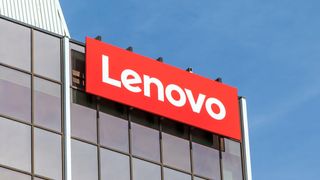Lenovo will "aggressively" target HPE and Dell EMC storage customers
An alliance with NetApp will see Lenovo push for a greater share in the enterprise storage market

Lenovo has thrown down the gauntlet to its main rivals in the data centre market, Dell EMC and HPE, stating that it is going to aggressively go after them with its new storage lineup.
At Lenovo Transform 2.0 in New York, the company announced that it would be rolling out ten new storage platforms as part of a new alliance with NetApp. Lenovo says that this will allow it to compete across the whole of the enterprise storage market, as opposed to focusing on the entry-level market.
According to the company, this will give Lenovo - as well as Lenovo and NetApp's channel partners - the ability to go toe-to-toe with Dell and HPE. Both companies have put big money into bolstering their storage divisions in recent years; Dell acquired storage specialists EMC, while HPE snapped up Nimble - both of which had been key Lenovo partners.
"We travelled around the world and every country we went in, they said 'why doesn't the fastest-growing server company partner with the fastest-growing storage company, because if they did, we would leave our existing partners'," said Kirk Skaugen, president of Lenovo's data centre group.
"There are some channel partners here from India, from China, from South Africa, from Latin America - all that are going to leave their Dell or HPE partnerships and move to Lenovo and NetApp, because now they can have an entire portfolio of server and storage.
"We're going to go aggressively after Dell EMC, HPE, Huawei and other large storage OEMs."
While Skauger's tone was distinctly adversarial, others within Lenovo were more pragmatic and measured regarding their relationship with the two data centre giants.
Get the ITPro. daily newsletter
Receive our latest news, industry updates, featured resources and more. Sign up today to receive our FREE report on AI cyber crime & security - newly updated for 2024.
"I would say that competition is competition," the CTO and head of strategy for Lenovo's data centre group, Peter Hortensius, told IT Pro. "I think from our seat, it depends on where you are as to who your biggest competitors are. So if you want to do US and western Europe, yeah, Dell and HPE are the core competitors for us. If I go to Asia, you know, Huawei shows up, Inspur shows up, H3C shows up - so it depends on where you're at in terms of how we compete."
"The more I can make a significant portfolio that drives value for my customers, I think the rest of it will come along. I need to be cognizant of what my competitors are doing and likely to do, so I'm positioned against that, but if I spend all my life just trying to beat somebody, I will probably miss the big thing that will allow me to do that."
Lenovo is now in a relatively strong position - it's the fastest-growing server vendor out of the industry's top ten, according to Gartner - but it has a significant hill to climb. Although Lenovo has been growing steadily, Gartner estimates put it in fourth place in the overall server market, with less than a third of the market share enjoyed by both Dell EMC and HPE. It also faces stiff competition from Huawei and third-place global vendor Inspur, who both present a significant obstacle in Lenovo's home territory of China.
Still, the company remains bullish about its future. Skauger gave some bold predictions to press, claiming that within the next four years, the company aims to be the biggest IT provider to hyperscale giants like Google, Amazon and Facebook.
"I think our goal is to be the largest hyperscale company in the world; probably top three by 2020. I think in the next four years we could be the largest hyperscale provider in the world, and I think we can together be the fastest-growing storage and data management company in the world."
Adam Shepherd has been a technology journalist since 2015, covering everything from cloud storage and security, to smartphones and servers. Over the course of his career, he’s seen the spread of 5G, the growing ubiquity of wireless devices, and the start of the connected revolution. He’s also been to more trade shows and technology conferences than he cares to count.
Adam is an avid follower of the latest hardware innovations, and he is never happier than when tinkering with complex network configurations, or exploring a new Linux distro. He was also previously a co-host on the ITPro Podcast, where he was often found ranting about his love of strange gadgets, his disdain for Windows Mobile, and everything in between.
You can find Adam tweeting about enterprise technology (or more often bad jokes) @AdamShepherUK.





